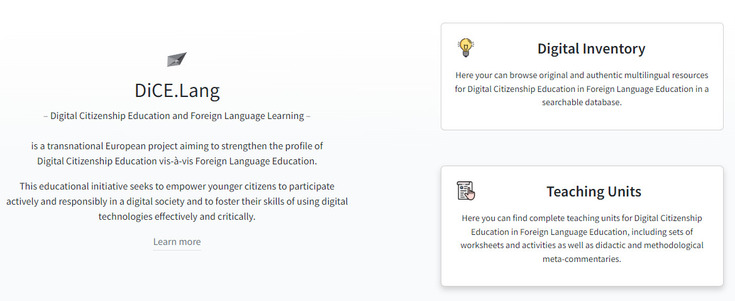Open educational resources
As the second intellectual output, the project consortium will develop, pilot and evaluate a package of open educational resources for DCE in FLE that can be used by teachers and educators to teach DCE for learners at all school types and for students at universities.
All open educational resources will come in a generic version in English and will then be transferred to other languages represented in the project consortium so as to integrate and establish a strong multilingual focus, which ensures that the OER can be used in multilingual settings.
What will the open educational resources consist of?
This OER package entails two dimensions. First, there will be fifty educational resources taking the form of concrete teaching units, including ready-to-use worksheets for DCE lessons in FLE, and a meta-commentary aimed at teachers explaining the purpose and methodological intent of each resource.
Since these resources are designed specifically for FLE, they each will address a particular concern, theme and objective typical of FLE (or a combination of concerns, objectives and themes), including:
- a focus on the language and critical digital literacies necessary for learners to understand, interpret, manage, share and create meaning in the growing density of digital communication channels
- an inter- and transcultural perspective on digital exchanges in a world where cultural encounters and cultural diversity are a crucial component of digital environments
- an identity-oriented component to strengthen learners’ personalities with respect to their increasingly constant online presence
- a content-oriented perspective in that it relates current themes of our times to digital transformations (e.g. migration, diversity, sustainability)
- a strong critical and meta-reflective component that makes it possible to reflect on the increasing digitization and digitalization of learners’ life-worlds
Second, the project will construct and compile a digital inventory of sixty original and authentic multilingual resources for DCE in FLE (including digital texts, literature, films and digital games). These resources will be tagged based on content criteria relevant to DCE, which turns this inventory into a database that teachers can use to search for specific themes.
Since many of these resources are inherently filmic, literary and multimodal, this inventory will also establish a strong aesthetic perspective in that it explores digital literature, digital texts, digital media and digital games in their meaning-making design elements (e.g. interactivity, multimodality, narrative potentials).
With a view to making this inventory productive for teachers, the inventory will also entail pedagogic and didactic meta-commentary.
Why do we need these open educational resources?
Across Europe, there is an immediate demand for this OER package. On one level, the cross-curricular implementation of the supranational European guidelines of DCE requires concrete and useful subject-specific examples for teaching practice. In a similar vein, the development of the OER package responds to immediate needs of all participating project partners. A preliminary survey into their educational contexts has shown specific competence-oriented curricular shifts: Digital Education, Digital Citizenship Education and the development of digital competences have become articulate – yet very broad and general – curricular demands that are still lacking concrete action plans for specific school subjects.
Therefore, this project will offer FLE-specific OER that will contribute to upgrading and implementing DCE in Foreign Language Education. Also, the digital and accessible nature of the OERs is an inevitable necessity to ensure and continue a coherent and cohesive education in situations where crises cause fragmentation and disruption of regular face-to-face teaching programmes, e.g. during lasting pandemics.
Our response to these urgent educational needs mirrors the innovation inherent to this project. All educational resources will be delivered in an open access format, ensuring easy access for practitioners.
A further innovation entails that these OER are published as best-practice examples covering a broad spectrum of Foreign Language Education themes and objectives vis-à-vis DCE. Thus, teachers can rely on these open educational resources being valuable and validated teaching guidance for engaging learners deeply in the learning processes that link DCE with FLE, and hence, for implementing competence-based and digital-oriented curricula more thoroughly.
The transfer and outreach of these OER entails the immediate contexts of all project partners (including school networks and university courses) and a broad European and possibly global context, meaning that the OER can be shared with a wide audience of teachers and learners via our online project platform. Another potential transfer can be achieved when coursebook publishers and material writers use our best-practice resources as guidance for producing further teaching materials.
Results
The project consortium is proud to present their package of open educational resources for DCE in FLE that can be used by teachers and educators to teach DCE for learners at all school types and for students at universities. It can be explored here: https://www.dicelang.gwi.uni-muenchen.de/index.php


